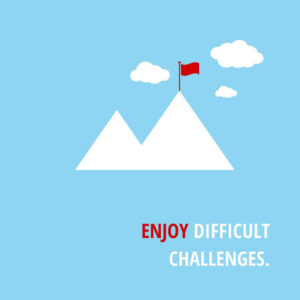To truly live well, we need to learn the art of having self-contained goals. I will explain, but let me give you a teaser: this means the ability to find enjoyment in your difficult times, to have inner harmony, to rarely get anxious or bored, and to routinely be in a state of flow. It is a remarkable skill to turn our tough times into opportunities for action or enjoyment.
The difference between someone who experiences a situation as an overwhelming threat and someone who can find enjoyment in it and see it as a strengthening opportunity is to do with the decision about how to interpret and approach the situation. The good news is that wealth, health and position have nothing to do with one’s capacity to function with self-contained goals. This is to do with our control of our thinking patterns, our control of our interpretation of events; our consciousness.
We can learn the skill to translate potential threats into enjoyable challenges. We can learn to take ownership of our experience and deciding to create our own goals and meaningful outcomes in a situation. We choose how to approach a situation so that we can grow from it and make the most of it, rather than letting external forces shape our experience. When we do this, we are involved in what is going on around us.We are internally driven; we are buffered from boredom and anxiety, and importantly we reshape our situations to experience a state of flow on a regular basis.
An example is if we are overwhelmed by bills. Instead of experiencing this as a negative stress that makes us feel sorry for ourselves, we see it as a challenge to get creative, show our discipline, skill up and experience great satisfaction when we eventually get back into the black. After this chapter of financial challenge in our lives, we are genuinely in a more solid and experienced position for our future. We have learnt a lot, and we are more motivated and informed to take charge, so that in future our spending does not outweigh our earnings.
Another example is when we experience a physical injury. We can sit and lick our wound, or we can see it as a time to really learn about bolstering our holistic health. We learn to take charge of our body with our food intake, our sensible sleep habits, our rehabilitation and our future exercise. We now have a solid reason for making ongoing decisions about self-care.
Or at work, we might decide to take a crisis on as a challenge and stay close to our inner selves as we coach ourselves through with supportive and encouraging self-talk. Once we are through our tough times, we have learnt so much; we are stronger.
We may be in a car accident. This is a time to take pride in being sensible in how we solve problems, getting through the immediate dangers and then focusing on the next stage of recovery and getting back on track. We can only optimally recover from any trauma if we are compassionate towards ourselves. It is natural to feel fear following danger. To then respond with self-compassion is a mindful choice. The key is to grab your challenging situation and take charge of it. You do not get dragged along; you choose to pick it up and shape the situation to get your desired outcome. And well done to you, as you become bold and navigate your approach.
How do we do this? How do we transform our situations so that we are creating internal goals and we are internally driven? First of all, we learn to appraise the situation and create clear goals to strive for. We become increasingly practised and confident at making these decisions and choices. From big life-direction choices to mundane daily choices, we weigh up the situation, gathering and assessing the relevant information to help us decide our course.
Over time we can do this with increasing confidence and minimal fuss. With these choices, we pragmatically breakdown the pathway needed. What are our obstacles and our challenges? What are our resources? What is our strategy and the sequence of sub-goals we will need to meet? What skills do we need to learn? We monitor our progress and adjust our approach with an openness and adaptability to the feedback. If we are not learning from what is going well or not going well, we won’t be able to optimise our approach, continue to skill up and achieve our goals effectively.
When choosing our own goals rather than letting an outside force choose our goals, we are more strongly dedicated to our course. This is of course a major positive and in itself brings power of conviction and a sense of ownership. When we feel internal control, our efforts are more reliable and consistent. We become more immersed and involved in our task. Being the captain of our own ship also means we have more control over steering it and adjusting our course if we feel we need to modify our approach or our end goal.
We need to avoid unrealistic goals, as well as the danger of just staying in the safe zone of our routines, where we do not have growth. We need to match our true capacity for growth with the demands and be realistic about our potential to reach our goal. There is also of course a direct marriage between our goals and the effort that we need to put in. The goals and the effort ultimately justify each other.
We must also sustain our attention to stay our course. By this I mean not only attention to the task that we are applying ourselves to, but attention to our inner thought processes as we move moment to moment toward our goal. How are we going with our self-talk? Are we tired and therefore becoming less buoyant, less our engaged self?Then take a break, get some rest. Are we making the most of the situation by looking for pleasure in that moment, either by finding beauty in the moment, or finding satisfaction in learning or achieving, or just enjoying the moment to sit and relax?
To find meaning in life we need to have an overarching direction for our goals and our value system. What are we working towards?What expression of ourselves are we nurturing?What matters in our lives that keeps guiding our choices? This sense of direction- this constant purpose in our goals -gives us a sense of harmony. It is a nod to guiding our lives towards that authentic expression of ourselves.
We can actually grow our sense of self worth and our experience of purpose though our difficult challenges. This is optimal experience.



Subscribe To Our Newsletter
Join our mailing list to receive Psych wisdom, advice and encouragement once a month.
"The Skills we need are not just common sense, we need to learn them from somewhere"
You have Successfully Subscribed!